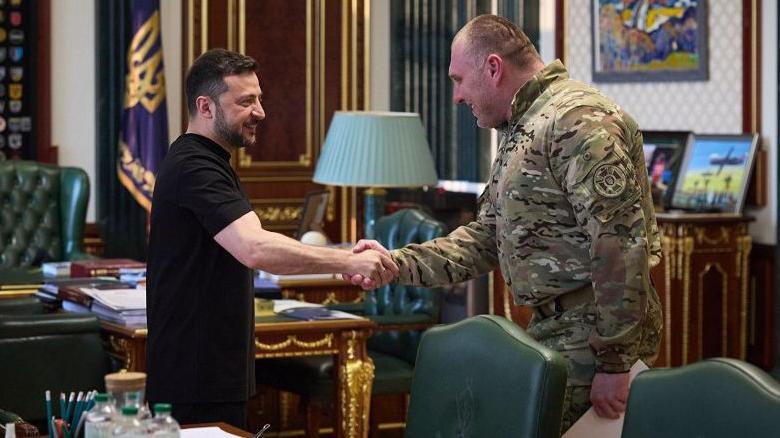Ukraine's audacious drone attack sends critical message to Russia - and the West

Ukrainian President Volodymyr Zelensky shakes hands with the Head of the Security Service (SSU) Vasyl Malyuk, who had reported on the operation against Russian airbases
- Published
It's hard to exaggerate the sheer audacity - or ingenuity - that went into Ukraine's countrywide assault on Russia's air force.
We cannot possibly verify Ukrainian claims that the attacks resulted in $7bn (£5.2bn) of damage, but it's clear that "Operation Spider's Web" was, at the very least, a spectacular propaganda coup.
Ukrainians are already comparing it with other notable military successes since Russia's full-scale invasion, including the sinking of the flagship of Russia's Black Sea fleet, the Moskva, and the bombing of the Kerch Bridge, both in 2022, as well as a missile attack on Sevastopol harbour the following year.
Judging by details leaked to the media by the Security Service of Ukraine (SBU), the latest operation is the most elaborate achievement so far.
In an operation said to have taken 18 months to prepare, scores of small drones were smuggled into Russia, stored in special compartments aboard freight trucks, driven to at least four separate locations, thousands of miles apart, and launched remotely towards nearby airbases.
Watch: Footage shows attack drones homing in on their targets as they sit on the tarmac.
"No intelligence operation in the world has done anything like this before," defence analyst Serhii Kuzan told Ukrainian TV.
"These strategic bombers are capable of launching long-range strikes against us," he said. "There are only 120 of them and we struck 40. That's an incredible figure."
It is hard to assess the damage, but Ukrainian military blogger Oleksandr Kovalenko says that even if the bombers, and command and control aircraft were not destroyed, the impact is enormous.
"The extent of the damage is such that the Russian military-industrial complex, in its current state, is unlikely to be able to restore them in the near future," he wrote on his Telegram channel.
The strategic missile-carrying bombers in question, the Tu-95, Tu-22, and Tu-160 are, he said, no longer in production. Repairing them will be difficult, replacing them impossible.
The loss of the supersonic Tu-160, he said, would be especially keenly felt.
"Today, the Russian Aerospace Forces lost not just two of their rarest aircraft, but truly two unicorns in the herd," he wrote.
Beyond the physical damage, which may or may not be as great as analysts here are assessing, Operation Spider's Web sends another critical message, not just to Russia but also to Ukraine's western allies.
My colleague Svyatoslav Khomenko, writing for the BBC Ukrainian Service website, recalls a recent encounter with a government official in Kyiv.
The official was frustrated.
"The biggest problem," the official told Svyatoslav, "is that the Americans have convinced themselves we've already lost the war. And from that assumption everything else follows."
Ukrainian defence journalist Illia Ponomarenko, posting on X, puts it another way, with a pointed reference to President Volodymyr Zelensky's infamous Oval office encounter with Donald Trump.
"This is what happens when a proud nation under attack doesn't listen to all those: 'Ukraine has only six months left'. 'You have no cards'. 'Just surrender for peace, Russia cannot lose'."
Even more pithy was a tweet from the quarterly Business Ukraine journal, which proudly proclaimed "It turns out Ukraine does have some cards after all. Today Zelensky played the King of Drones."
This, then, is the message Ukrainian delegates carry as they arrive in Istanbul for a fresh round of ceasefire negotiations with representatives from the Kremlin: Ukraine is still in the fight.
The Americans "begin acting as if their role is to negotiate for us the softest possible terms of surrender," the government official told Svyatoslav Khomenko.
"And then they're offended when we don't thank them. But of course we don't – because we don't believe we've been defeated."
Despite Russia's slow, inexorable advance through the battlefields of the Donbas, Ukraine is telling Russia, and the Trump administration, not to dismiss Kyiv's prospects so easily.
More on War in Ukraine
At least seven dead after two Russian bridges collapse
- Published1 June

Get our flagship newsletter with all the headlines you need to start the day. Sign up here.